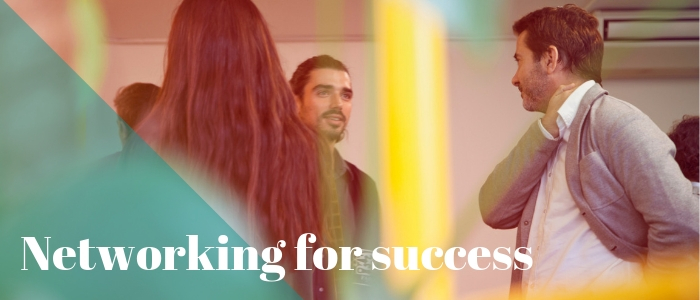Networking for success
In today’s interconnected world, your career often relies on the people you know and the professional relationships you’ve made. Your ability to connect and communicate effectively can make the difference in your job search by opening doors that were previously closed. In the modern job market, there are several benefits of networking that can lead to personal and professional success, including:

- receiving career advice
- learning about new opportunities
- building a professional network
- boosting business
- discussing industry developments
Networking can be overwhelming, however. Meeting and speaking with strangers for your own personal gain is often awkward and exhausting, and can fill your personal calendar. So, it’s important to take the time to perfect your preparation, execution and follow-up to make you feel more confident. Here are some ways to avoid discomfort and ensure that you leave a positive impression at any event.
Before the event
Update your CV
While you don’t want to be pushing your CV into everyone’s hands at the event itself, it could be helpful to have a few copies on you in case you make a valuable connection. Sometimes recruiters attend networking events solely for the purpose of meeting potential hires and gauging interest in new roles; they will likely ask for a copy of your CV. Be sure you’ve updated yours to best reflect your talents and print a few copies. Consider hiring a business coach to help ensure the changes you make are effective for your industry.
Determine your networking style
Whether you’re introverted or a social butterfly, you should be catering your networking experiences to your strengths. For introverted people, intimate networking situations with fewer people might help you make more meaningful connections. If you’re more outgoing, however, larger events would be beneficial because they allow you to interact with more people. If you have difficulty finding an event that meets your socialising style, consider planning your own. This should help you narrow down event choices and feel confident enough to set yourself up for successful networking.
Do your research
No matter the nature of the event, you’ll want to make sure you’re doing at least a little research beforehand to ensure you can participate in a variety of conversation. Spend an hour or two reading up on the latest industry trends, as well as the companies that will be attending the event to get a brief understanding of how to prepare. Not only will it help you come across as well-informed and passionate, but it will also prove your interest in the companies themselves. You can find the most pertinent information on company websites, as well as business or trade journals.
During the event
Listen
It’s important to be engaged while networking, not thinking of your next question or scheming about how to work your resume into the conversation. Thinking too much instead of listening and participating will not only make things more awkward, but it will also likely make you come across as uninteresting and unfriendly. Make sure you actively listen while you let the other person speak by maintaining eye contact, nodding and asking follow-up questions.
Don’t ask to be hired
Along the same lines, make sure you’re not steering the conversation in the direction of your hireability. Asking for a job outright can seem rude and unprofessional. Instead, ask for advice or contacts that could offer future opportunities and help you along your career path. This should still build up your network base while possibly leading to jobs down the line.
Exchange contact information
Expanding your network relies on establishing connections and relationships with people. While it may seem awkward to ask for a phone number or email, recruiters and others at networking events are also looking to expand their contacts and will likely be happy to exchange information. Try to carry a professional notebook throughout the event to organise contact information as well as your thoughts. This should make things easier the following day when you reach back out.
After the event
Find a topic on which to follow up
It’s important to continue developing the connections you made at the networking event. Narrow down a list of those you met that you’d like to keep in contact with and craft a personalised follow-up email about the event. Did you discuss a topic that you recently read an article about? Did you make a connection over shared interests? The more you can share, the easier it will be to foster that connection and build your network. This will segue into a natural ask to connect on LinkedIn and stay in touch.
Say thank you
Sending a thank you note may seem old-fashioned, but it can make a world of difference in a potential employer’s opinion of your professionalism and thoughtfulness. Try to send a note or email within 24 hours of the event thanking your new contact for their time and advice at the event. Try to include a specific piece of advice or conversation topic to keep it personal. Then, be sure to continue maintaining your LinkedIn profile in case they want more information about you.
Use these suggestions as the building blocks of a strategy at your next networking event. While no networker is alike, approaching each event with a rough plan of attack should help eliminate any awkwardness and set you up for an expanded network and ultimate career success.

Find a coach dealing with Career coaching
All coaches are verified professionals






